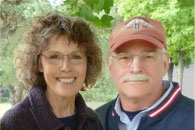 Please take nine minutes to watch this video, beautifully produced by Desiring God, featuring a woman crippled because of a doctor’s mistake, who lost her child’s life because of another doctor’s mistake, whose husband left her for another woman, and who has surely faced far more than her share of grief. If that sounds depressing, watch it anyway, and see your heart encouraged:
Please take nine minutes to watch this video, beautifully produced by Desiring God, featuring a woman crippled because of a doctor’s mistake, who lost her child’s life because of another doctor’s mistake, whose husband left her for another woman, and who has surely faced far more than her share of grief. If that sounds depressing, watch it anyway, and see your heart encouraged:
Please don’t skip the video, or if you read first what I’ve written below, end by watching it. If you wish to think further about the problem of evil and suffering and how it affects believers and unbelievers alike, you might be interested in the excerpt below from my book If God Is Good. (In my next post, I’ll share about Bart Ehrman, a well-known “Christian” who lost his faith in Christ due to the problem of evil and suffering, in contrast to Vaneetha.)
While people living in relative comfort reject faith in God due to the problem of evil, those subjected to the worst evil and suffering often turn to God. Isn’t it remarkable that from Sudan to China to Cambodia to El Salvador, faith in God grows deepest in places where evil and suffering have been greatest?
While Western atheists turn from belief in God because a tsunami in another part of the world caused great suffering, many brokenhearted survivors of that same tsunami found faith in God. This is one of the great paradoxes of suffering. Those who don’t suffer much think suffering should keep people from God, while many who suffer a great deal turn to God, not from Him.
Imagine eavesdropping on a conversation between an atheist and the very people whose suffering He uses as an argument for disbelieving in God. After hearing the atheist’s case, someone says, “You’ve lost your faith because of my suffering? But my faith in God has grown deeper than ever. Why would I turn away from the only one who can comfort me, the only one who has planned eternal life for me, the only one who suffered immeasurably, beyond any of us, so that one day I need suffer no longer?”
You won’t find the strongest Christian churches in the world in affluent America or Europe, where the problem of evil has the most traction. In Sudan, Christians are severely persecuted, raped, tortured, and sold into slavery. Yet many have a vibrant faith in Christ. People living in Garbage Village in Cairo make up one of the largest churches in Egypt. I have interviewed numbers of people who take comfort in knowing that this life is the closest they will ever come to Hell.
As an army of brutal invaders demolished his nation, a man who wrestled with the problem of evil and suffering said this:
Though the fig tree does not bud
and there are no grapes on the vines,
though the olive crop fails
and the fields produce no food,
though there are no sheep in the pen
and no cattle in the stalls,
yet I will rejoice in the LORD,
I will be joyful in God my Savior.
The Sovereign LORD is my strength. (Habakkuk 3:17–19)
 Many Christians who have faced evil and suffering embrace their faith with greater conviction. While researching If God Is Good, I interviewed Scott and Janet Willis. An unskilled truck driver who obtained his license through bribery allowed a large object to drop onto a Milwaukee freeway in front of their van. Their gas tank exploded, killing six of their children.
Many Christians who have faced evil and suffering embrace their faith with greater conviction. While researching If God Is Good, I interviewed Scott and Janet Willis. An unskilled truck driver who obtained his license through bribery allowed a large object to drop onto a Milwaukee freeway in front of their van. Their gas tank exploded, killing six of their children.
Scott Willis said,
The depth of our pain is indescribable. However, the Bible expresses our feelings that we sorrow, but not as those without hope. What gives us our firm foundation for hope are the words of God found in Scripture.... Ben, Joe, Sam, Hank, Elizabeth and Peter are all with Jesus Christ. We know where they are. Our strength rests in God’s Word.
The Willis family’s story is exactly the kind that atheists feature as overwhelming evidence for God’s nonexistence. Yet, when I interviewed this couple fourteen years after the tragic event, Janet said, “Today I have a far greater understanding of the goodness of God than I did before the accident.” This might have taken my breath away, had I not already heard it from others who’ve also endured unspeakable suffering.
At the end of our two-hour conversation, Scott Willis said, “I have a stronger view of God’s sovereignty than ever before.”
Scott and Janet did not say that the accident itself strengthened their view of God’s sovereignty. Indeed, Scott’s overwhelming sense of loss initially prompted suicidal thoughts. Rather, their faith grew as they threw themselves upon God for grace to live each day. “I turned to God for strength,” Janet said, “because I had no strength.” She went to the Bible with a hunger for God’s presence, and he met her. “I learned about Him. He made sense when nothing else made sense. If it weren’t for the Lord, I would have lost my sanity.”
I asked Scott and Janet, “What would you say to those who reject the Christian faith because they say no plan of God—nothing at all—could possibly be worth the suffering of your children, and your suffering over all these years?”
“Eternity is a long time,” Janet replied. “It will be worth it. Our children’s suffering was brief, and they have the eternal joy of being with God. We and their grandparents have suffered since. But our suffering has been small compared to our children’s joy. Fourteen years is a short time compared to eternity. We’ll be with them there, forever.”
French philosopher La Rochefoucauld may have best captured the difference between lost faith and the deepened faith of those like Scott and Janet Willis and Vaneetha Rendall Risner: “A great storm puts out a little fire, but it feeds a strong one.”
By the way, I appreciated this video update on the Willis family produced in 2014, 20 years after the accident, and featuring some of their surviving 3 children and their 34 grandchildren.
Photo by Jason Blackeye on Unsplash




